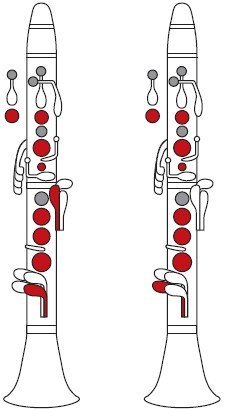The C Lydian Scale: A Clarinet's Best Friend
The clarinet's role in music is greatly enhanced by a captivating scale known as the C Lydian Scale. This scale boasts a rich history spanning centuries and offers an intriguing twist on the traditional major scale. With its raised fourth degree, the C Lydian Scale creates a fresh, airy feeling that musicians find irresistible.

Clarinet Fingering Charts are always FREE at MartinFreres.net!
The C Lydian Scale Through History and Genres
Throughout history, the C Lydian Scale has made its mark in various music genres. Jazz musicians particularly enjoy incorporating it, seamlessly blending the scale's jazzy sounds with underlying harmonies. Have you noticed the dreamy quality it adds to compositions? That's the Lydian magic at work! But it doesn't stop at jazz – this versatile scale has found its way into classical pieces, pop songs, and even movie soundtracks.
| Genre | Usage of C Lydian Scale |
|---|---|
| Jazz | Frequently used in improvisations and compositions |
| Classical | Adds unique color to orchestral and chamber works |
| Pop | Creates distinctive melodic hooks |
| Film Scores | Evokes a sense of wonder or otherworldliness |
Clarinet Legends and the C Lydian Scale
Let's reminisce about the clarinet players who've left their mark on music history. Many of these greats used scales like C Lydian to create shining, vibrant moments in their solos. Take Benny Goodman, for instance – a true legend in the clarinet world. He often incorporated Lydian twists in his improvisations, captivating his audience and leaving them in awe.
What Makes the C Lydian Scale Special?
You might wonder what sets the C Lydian Scale apart from the regular C major scale. It brings a sense of lightness and openness to music, allowing you to create soaring sounds while maintaining a grounded feel. When played on a Martin Freres clarinet, the craftsmanship truly shines through, enhancing those luminous tones.
Practicing and Improvising with C Lydian
For students and seasoned pros alike, the C Lydian Scale offers a fantastic way to spice up practice sessions. It's an excellent tool for sparking imagination in improvisation. Try experimenting with it by incorporating unique rhythmic patterns or adding a jazzy swing feel. You'll be amazed at how expansive your sound becomes!
Enhancing Compositions with C Lydian
The C Lydian Scale isn't just great for improvisation; it can also elevate your compositions. Whether you're writing for clarinet or composing for a group, that distinct fourth note can serve as a refreshing pivot, energizing the harmonic structure. Before long, you'll find yourself naturally incorporating Lydian flair into your tunes!
The Lasting Impact of C Lydian in Clarinet Music
As you delve into clarinet music, remember the significant impact of the C Lydian Scale. It's more than just a clever technique; it's a valuable tool that spans across genres and composers. The next time you're deep in a practice session or brainstorming a new piece, consider how you can use the beauty and versatility of the C Lydian Scale. Let your creativity flow, push your boundaries, and savor the moment!
Caring for Your Instrument
While exploring the C Lydian Scale, don't overlook the importance of your instrument's condition. Regular maintenance of your Martin Freres clarinet ensures you can fully appreciate the expressiveness of the C Lydian sound. After all, well-maintained instruments open doors to greater musical exploration!
Table of Contents
- The C Lydian Scale: A Clarinet's Best Friend
- The C Lydian Scale Through History and Genres
- Clarinet Legends and the C Lydian Scale
- What Makes the C Lydian Scale Special?
- Practicing and Improvising with C Lydian
- Enhancing Compositions with C Lydian
- The Lasting Impact of C Lydian in Clarinet Music
- Caring for Your Instrument








